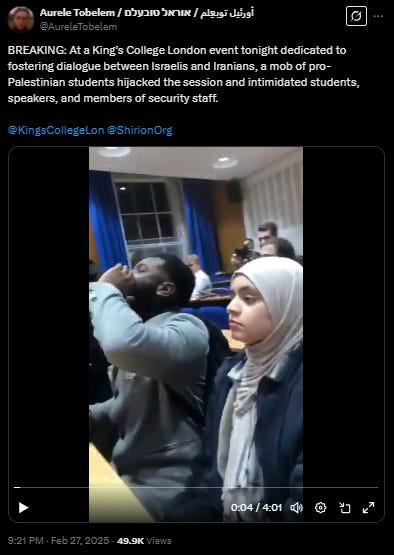The Growing Threat of Radicalization in UK Universities
A new report by Catherine Perez-Shakdam from We Believe in Israel exposes the threat of extremist infiltration in UK Universities
British universities have long been celebrated as places where free thinking and open debate thrive. A new report by Catherine Perez-Shakdam, the director of the UK grassroots organization We Believe in Israel, examines the growing problem of extremist influences infiltrating student organizations, faculty, and course materials.
"This issue demands urgent attention, as our universities—once bastions of intellectual freedom—are being subverted by an agenda of intimidation, ideological coercion, and foreign-backed radical influences."
—Catherine Perez-Shakdam
King’s College London (KCL) serves as a striking example of how this crisis is playing out. The report describes instances where terrorist propaganda has been introduced into academic settings, events have been disrupted by aggressive protests, and Jewish students have faced harassment simply for their presence. The report asserts that if left unaddressed, the culture of radicalization threatens to erode the foundation of higher education and reshape universities into places of ideological control rather than centers of learning.
The Radicalization Crisis
The report outlines several factors that have contributed to the spread of extremism within UK universities. Political activism has increasingly been co-opted by those seeking to push extreme narratives, particularly concerning international conflicts such as the Israel–Palestine issue. Under the guise of human rights advocacy, some student organizations have embraced rhetoric that normalizes violence and silences opposition.
Extremist networks have also found ways to influence student groups. Some activist organizations, such as Students for Justice in Palestine (SJP) and Stand For Justice (S4J), have been linked to broader international networks. Reports from the United States suggest that SJP’s national structure has received financial and ideological support from groups that researchers have associated with Hamas such as American Muslims for Palestine (AMP). While UK-based chapters operate independently, the scale and organization of their activities indicate possible external coordination or funding. Although many of these groups receive financial support from student unions, concerns remain about additional undisclosed funding sources and overseas ties. These external influences contribute to the dissemination of radical narratives on campus under the guise of student activism.
"Radical actors do not operate in a vacuum. The unchecked flow of foreign funding and ideological influence has enabled the radicalization of British students, with universities becoming unwitting—or at times complicit—facilitators. It is the duty of the government to sever these connections and prevent British academia from being weaponized against the very principles it was built upon."
—Catherine Perez-Shakdam
A lack of proactive measures from universities has also allowed the problem to grow unchecked. Despite legal obligations under the Prevent Duty, which is part of the Counter-Terrorism and Security Act 2015, many institutions have failed to confront radicalisation effectively. Rather than enforcing rules that ensure open debate and student safety, some administrations have remained passive, avoiding decisive action out of fear of controversy. This reluctance has fostered an environment where intimidation flourishes, resulting in physical threats, disrupted events, and targeted harassment—violations that are already covered under the Public Order Act 1986 but rarely enforced on campuses.
Perez-Shakdam emphasizes that universities must act swiftly:
"Universities must enforce the rule of law without hesitation. The Counter-Terrorism and Security Act 2015 (Prevent Duty) places a legal obligation on institutions to safeguard students from being drawn into extremism, yet enforcement has been alarmingly lax. The single most immediate step universities must take is to adopt a zero-tolerance approach to campus radicalisation by:
Ensuring all external speakers and student organisations are rigorously vetted to prevent universities from being exploited as platforms for extremism.
Holding radical student groups accountable—those engaging in intimidation, harassment, or incitement must face real consequences, including bans or disciplinary action.
Collaborating proactively with law enforcement to track and disrupt networks seeking to radicalise students under the guise of activism."
Another key concern raised in the report is the role of external funding. There are indications that certain radical student groups are benefiting from financial backing linked to foreign organizations, which raises alarms about outside influences shaping campus activism. The lack of transparency regarding student group funding makes it difficult to track and address these connections, further complicating efforts to curb extremism.
The Case of King’s College London: A Microcosm of a National Crisis
The growing tensions on university campuses were on full display at a recent KCL event titled "From Conflict to Connection: Israelis and Iranians in Dialogue." Anti-Israel activists disrupted the talk, forcing Iranian activist Faezeh Alavi to leave under security protection. As protesters shouted slogans and shut down the discussion, the event was cut short—another example of how radical elements are using intimidation tactics to silence perspectives they oppose.
Perez-Shakdam highlights this as a failure of university leadership:
"The situation at King’s College London, as outlined in our report, exemplifies the failure of institutional courage. Speakers have been silenced through mob violence, Hamas propaganda has been distributed as “academic material,” and Jewish students have been targeted simply for existing on campus. This must not be tolerated in a society that upholds freedom of thought and the rule of law.."
The report highlights how this incident is just one in a pattern of similar disruptions across UK universities. The failure of university administrations to prevent or respond effectively to such incidents only emboldens those who seek to impose ideological conformity through fear.

Policy Recommendations
The report recommends a full parliamentary inquiry into extremist influence in universities, focusing on foreign funding sources, radical student groups, and administrative failures. It also stresses the need for stronger enforcement of existing laws to ensure that harassment, intimidation, and disruptions are met with legal consequences.
Perez-Shakdam calls for decisive action, stating:
"The UK government must launch a full-scale investigation into the foreign funding of radical student groups, particularly those with links to proscribed organizations or hostile foreign states. Our report reveals that extremist student networks often receive funding from opaque sources, yet little is being done to expose and disrupt these financial pipelines."
Mandate full financial transparency for student societies, requiring detailed disclosure of all external funding, donors, and affiliated organisations.
Strengthen enforcement against organisations acting as proxies for foreign influence, particularly those funnelling money into radical activism under the guise of humanitarian aid or academic partnerships.
Impose strict consequences on universities that turn a blind eye, including the suspension of funding or regulatory penalties for institutions that fail to protect their students and uphold British law.
The report emphasizes how efforts to counteract radicalization should be expanded, including initiatives that foster open dialogue, interfaith engagement, and clear reporting mechanisms for students concerned about extremist activities.
Perez-Shakdam concludes:
Universities exist not to shield students from challenging ideas, but to cultivate a space where knowledge triumphs over intimidation. When institutions allow extremism to take root, they betray not only their students but the very fabric of British society. There must be a reckoning.
"If the UK’s academic institutions do not reclaim their role as centers of learning and debate, then Parliament, law enforcement, and civil society must act to restore the integrity of our universities."




You are doing a very important work. Thank you. In my view, a new world war started in 1979 with the Islamic Republic of Iran and, with the help of worldwide organizations of the Muslim Brothers , the world process of Islamisation of the Western world from inside, quietly, step by step starting gangrène of the education system everywhere and at all levels . It will be a Hundred Years’ War and we might have already lost because of the weight of demography. But we cannot give up the fight